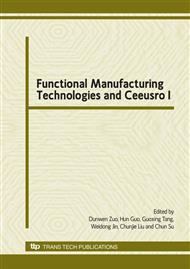p.529
p.532
p.537
p.540
p.545
p.550
p.555
p.559
p.564
Study on Influence of Machine Tool Thermal Deformation During ELID Super-Precision Grinding
Abstract:
For ELID (Electrolytic In-process dressing) super-precision grinding, as the result of machine tool thermal deformation, actual grinding depth is much less than nominal grinding depth. However, controlling accurately grinding depth is more significant for realizing normal grinding process, increasing material removal rate and analyzing rightly material removal mechanism. In this paper, based on study of thermal deformation law and compensating technique, three feeding strategies for ELID grinding was analyzed. On the premise of measuring of total thermal deformation of machine tool, indirect compensating numerical value may be preset to ensure effective contact between wheel and workpiece, and right evaluation method of material removal rate was explored.
Info:
Periodical:
Pages:
545-549
Citation:
Online since:
January 2010
Authors:
Price:
Сopyright:
© 2010 Trans Tech Publications Ltd. All Rights Reserved
Share:
Citation:


